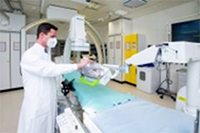World's Most Modern Cardiac Catheter Robot in Freiburg

Minimally invasive cardiac interventions can now be carried out more gently and precisely at the Medical Center - University of Freiburg / Only five similar devices in use across Europe / Advantages for patients and doctors.
The world's most modern cardiac catheter robot has been in use at the Department of Cardiology and Angiology of the University Heart Center Freiburg - Bad Krozingen. This makes the University Heart Center at the Medical Center - University of Freiburg one of only six locations in Europe where this future-oriented technology is available. With the assistance robot, doctors can widen the coronary arteries or insert stents, for example after a heart attack, with the aid of the latest imaging. With the help of numerous sensors and motors, the robot arm is steered by the treating physicians via a control console with a high-resolution monitor, which can be located at any distance from the treatment table. The remote control of the robot has other advantages, too: On the one hand, the doctors are outside the radiation area of the imaging. On the other hand, Freiburg experts could also supervise or even carry out interventions telemedically in future.
“Robotics open up new horizons in interventional cardiology, both diagnostically and therapeutically. With the support of the robot, we can perform interventions on the coronary arteries even more precisely and at the same time very carefully,” states University Professor Dr. Dr. h.c. Christoph Bode, Medical Director at the Department of Cardiology and Angiology I at the Medical Center - University of Freiburg. “We are pleased that we can use this new technology as one of the first clinics in Europe for the benefit of our patients,” Bode says. Being one of the largest centers for cardiovascular medicine in Germany, the doctors at the University Heart Center Freiburg - Bad Krozingen have a lot of experience in using new techniques and performing complex cardiac catheter interventions.
Artificial intelligence allows for highest quality standards
In the event of an intervention, the robot arm memorizes motor movements and material selection, which in the future can be called up anonymously via cloud. “In this way, the most successful algorithms for patients with a comparable coronary artery anatomy can be called up and then continuously refined - an excellent example of the use of artificial intelligence in medicine,” says Prof. Dr. Constantin von zur Mühlen, Head of Interventional Cardiology at the Department of Cardiology and Angiology I at the Medical Center - University of Freiburg. In order to increase the benefits of this new technology even further, clinical use is closely monitored scientifically. “Due to the higher precision and better protection of employees from radiation, this technology has the potential to be defined as a new standard,” von zur Mühlen adds.
“Technological progress and digitization are essential building blocks for making medicine even more future-proof. The use of the digital assistant enables quality control of the operation process in real time, as well as a simplified evaluation across different locations. This is a prime example of quality-centered, top-class university medicine,” states Prof. Dr. Frederik Wenz, Chief Medical Officer of the Medical Center – University of Freiburg.
Back